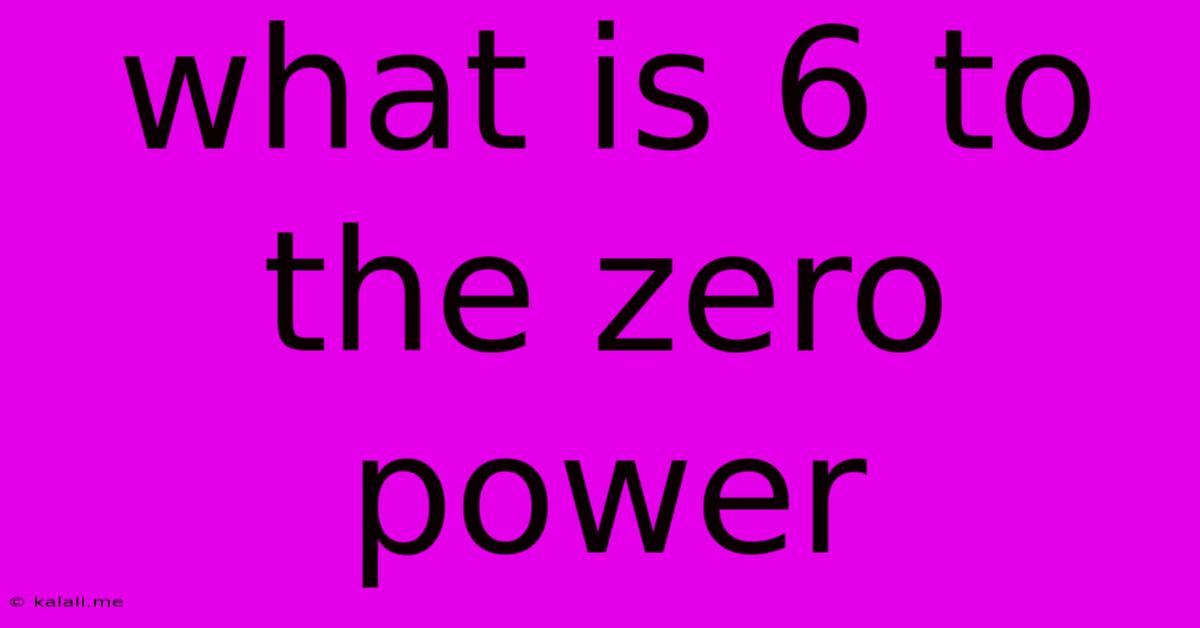What Is 6 To The Zero Power
Kalali
May 10, 2025 · 2 min read

Table of Contents
What is 6 to the Zero Power? Understanding Exponents and the Zero Exponent Rule
What happens when you raise a number to the power of zero? It's a question that often trips up math students, but understanding the concept is surprisingly straightforward. This article will explain what 6 to the zero power (6⁰) equals and delve into the underlying mathematical principles. By the end, you'll have a solid grasp of the zero exponent rule and its applications.
The Answer: 6⁰ = 1
Yes, any non-zero number raised to the power of zero equals 1. This includes 6⁰, which equals 1. This might seem counterintuitive, but it's a consistent rule derived from the properties of exponents.
Why Does Any Number to the Power of Zero Equal One?
Let's explore the logic behind this rule using a simple pattern with powers of 6:
- 6³ = 6 x 6 x 6 = 216
- 6² = 6 x 6 = 36
- 6¹ = 6
- 6⁰ = ?
Notice the pattern: as the exponent decreases by 1, the result is divided by 6. Following this pattern:
- 6¹ / 6 = 6⁰ = 1
This pattern holds true for any base number (except zero, as we'll discuss below).
Another Way to Understand the Zero Exponent Rule
We can also understand this rule through the properties of exponents. Recall the rule of dividing exponents with the same base:
xᵃ / xᵇ = x⁽ᵃ⁻ᵇ⁾
Let's apply this rule to 6² / 6²:
6² / 6² = 6⁽²⁻²⁾ = 6⁰
Since any number divided by itself equals 1 (except zero), we have:
6² / 6² = 1
Therefore, 6⁰ = 1. This demonstrates the consistency of the zero exponent rule with established exponent properties.
The Exception: 0⁰
The expression 0⁰ is considered an indeterminate form. It doesn't have a single, defined value. This is because the limit of xʸ as both x and y approach zero depends on the path taken. Therefore, while 6⁰ and other non-zero numbers raised to the power of zero are clearly defined, 0⁰ remains undefined within standard mathematical conventions.
Practical Applications of the Zero Exponent Rule
The zero exponent rule isn't just a theoretical concept; it has practical applications in various areas of mathematics and science, including:
- Algebra: Simplifying expressions and solving equations.
- Calculus: Evaluating limits and derivatives.
- Computer Science: In algorithms and data structures.
Understanding this seemingly simple rule is foundational to more advanced mathematical concepts.
Conclusion: Mastering the Zero Exponent
The fact that 6 to the zero power equals 1 isn't arbitrary; it's a logical consequence of established rules concerning exponents. By understanding the patterns and properties discussed above, you can confidently apply the zero exponent rule to various mathematical problems and deepen your understanding of exponential functions. Remember the exception for 0⁰, and you'll have a complete grasp of this important mathematical concept.
Latest Posts
Latest Posts
-
If Your 31 What Year Were You Born
Jul 15, 2025
-
How Many Tenths Are In An Inch
Jul 15, 2025
-
Which Word Has The Most Positive Connotation
Jul 15, 2025
-
How Do I Send An Evite Reminder
Jul 15, 2025
-
When Performing A Self Rescue When Should You Swim To Shore
Jul 15, 2025
Related Post
Thank you for visiting our website which covers about What Is 6 To The Zero Power . We hope the information provided has been useful to you. Feel free to contact us if you have any questions or need further assistance. See you next time and don't miss to bookmark.